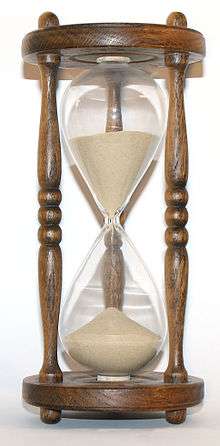Yesterday (time)
Yesterday is a temporal construct of the relative past; literally of the day before the current day (today), or figuratively of earlier periods or times, often but not always within living memory.
| The date | |
|---|---|
| Yesterday is between Wednesday, 05 August 2020 and Thursday, 06 August 2020, subject to local time zone. | |
| Time |
|---|
 |
| Current time |
| 09:43, 7 August 2020 (UTC) |
|
| Look up yesterday in Wiktionary, the free dictionary. |
Learning and language
The concepts of "yesterday", "today" and "tomorrow" are among the first relative time concepts acquired by infants.[1] In language a distinctive noun or adverb for "yesterday" is present in most but not all languages, though languages with ambiguity in vocabulary also have other ways to distinguish the immediate past and immediate future.[2] "Yesterday" is also a relative term and concept in grammar and syntax.[3]
Yesterday is an abstract concept in the sense that events that occurred in the past do not exist in the present reality, though their consequences persist. An often-quoted aphorism states something along the lines of "Yesterday is history, tomorrow is a mystery, but today is a gift. That is why it is called the present".[4] The earliest version of this aphorism appears to occur in 1912, with the Frank M. Pixley quote, "Yesterday is history; to-morrow is merely a hope; to-day is the only absolute asset of time that is yours".[5]
Some languages have a hesternal tense: a dedicated grammatical form for events of the previous day.
References
- Cath Arnold Child Development and Learning 2-5 Years: Georgia's Story 0761972994 1999 "She is referring, not only to her correct use of language, but to the concept of 'yesterday', which she uses correctly in this instance."
- Mary R. Key The Relationship of Verbal and Nonverbal Communication 3110813092 1980 p.20 "The consideration of time calls for communicating the concept of 'yesterday' and 'tomorrow'. In some languages the same term is used for both of these English words, though assuredly the people also have a way of dealing with past and future actions. For example, in Chama (Tacanan) mekawaxe means both 'yesterday' and 'tomorrow'. It is of interest that this same language group deals with space in a similar way. Thus, in Chama sam' means both 'left' and 'right';"
- The Function of tense in texts Jadranka Gvozdanović, Theodorus Albertus Johannes Maria Janssen, Östen Dahl - 1991 - Volumes 144 to 146 - Page 100 "Yesterday is relative to the day 'where we are', a minute ago to the minute, more or less, 500 years ago to 'our present' in a thematically suitable sense, perhaps 'this century', or 'modern times'. "
- As spoken in Kung Fu Panda, (2008), written by Jonathan Aibel and Glen Berger.
- Frank M. Pixley, Thoughts and Things (1912), p. 29.
External links
| Look up yesterday (time) in Wiktionary, the free dictionary. |
| Wikiquote has quotations related to: Yesterday (time) |
